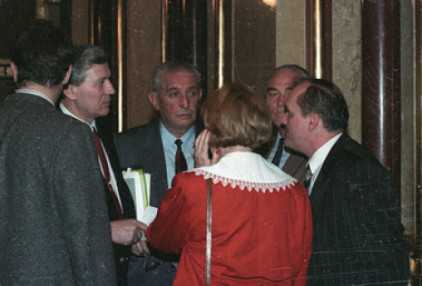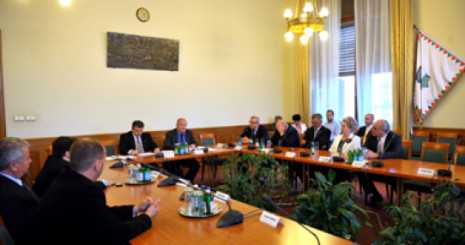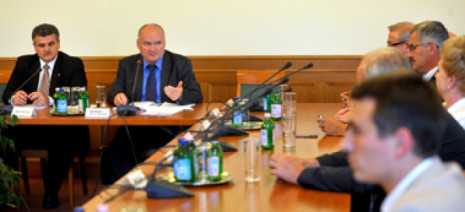Regulating National Defence – Stability and Change
Szöveg: György M. Tóth | 2011. június 21. 9:28As a member of the group of experts in charge of preparing the first Act on National Defence in the years following the 1989 regime change, at the June 14 meeting of the Defence and Law Enforcement Committee of the Parliament the Defence Minister referred several times to the legislation that took place 18 years ago. We interviewed Dr. Csaba Hende about this and related issues.
While talking about the general consensus on passing the Act on National Defence and the system of Administrative Government Commissioners in the defence administration, you made several references to Act CX of 1993 on national defence. Is your attachment so strong to the product of this special branch of law, which was born under extraordinary circumstances?

You have mentioned that the Act of 1993 laid lasting foundations. In your opinion, while regulating the issues of national defence, should one strive for stability and resist any major changes?
As a matter of fact, the most fundamental rules have not changed. There is no point in trying to improve good things at any cost. Back in 1993, the structure, the areas covered by the regulations, the legal solutions and the constitutional procedures which have not changed in any essential respects were worked out at six-party talks within six months. Obviously, this legislation had some antecedents, because in preparing the Act of 1993, we went back to the acts of 1848, Act I of 1939 and Act I of 1976 and studied the most important laws on national defence of the given eras in the past one and a half centuries. Even though the National Defence Act is not the act of the armed forces, as regards the regulation, we had to bear in mind that the military is a conservative organization where laws are written in blood. Experimentation and ill-considered changes have no place here. This is a profession, a branch of law that is rooted in Hungarian constitutionalism and has developed within it over centuries, so we continue these traditions, alongside the changes and amendments that have been made in the meantime. The Hungarian Defence Forces may be assigned some new tasks which did not arise before in the absence of the necessitating factors. Regarding the present Act, let me give you an example: under the proper conditions and in compliance with the requirements to be specified at a later date, the HDF will participate in the governmental tasks involved in the programs of labor in the public interest, which are to be launched on a large scale as of January 1, 2012. Contribution will be their main task, as the military equipment and logistic capabilities of the armed forces are indispensable for the work of building the country that may mobilize thousands of people. The ‘how’ of their contribution will take shape in due time. We need to look at the concrete cases to specify, for example, what the HDF should be tasked to do in connection with supplying and accommodating communal workers at the construction of a flood storage reservoir – and we could go on to add other tasks and fields to the list. I am convinced that this contribution will be a very nice new responsibility of the Hungarian Defence Forces.
The bombing of Barcs in 1992 revealed that neither the Constitution nor the Act on National Defence of the time included any articles authorizing emergency action in such circumstances. It was then that the article on unforeseeable attacks came to be included in the fundamental law, and later in the Act on National Defence…

You used the word ‘laconic’ to describe the new bill. Why do you think ‘terseness’ is a virtue? Instead of the more than 200 articles of the law currently in effect, the new bill has only 85 ones. Does this fact justify terseness?
If this were the only thing to be considered, it would be a virtue in itself. Our bill includes only what the cardinal laws should regulate. A valuable lesson we have learnt is that during the past 20 years too many laws were enacted, so much so that we got overwhelmed by their mass. This was because the legislators did not make them on the proper level and with the proper content, so they kept switching the levels of decision-making. I believe that every article and the cases they cover have their place in one or other law on the proper level, be it the Constitution, a law that can be passed by two-thirds or even by simple majority, the decrees issued on various levels or the implementing regulations. With the new bill, or to be more precise, by passing the Act which is now under preparation, we are going to lay the new foundations for regulating the field of national defence. To draw a comparison with construction, we will put up the main walls. The partitions, for example the implementing regulations must be ready by January 1, 2012, the day of coming into effect.
Having discussed the items on the agenda of the new national defence regulation, the Defence and Law Enforcement Committee proceeded to debate the bill on disaster relief and the amendments to certain related laws. Some of the articles under discussion used to be included in the Act on National Defence.

In addition to the Act on National Defence, in 1993 you also worked out the laws on legal status, which was an outstanding legislative performance. Is there any upcoming special re-regulation in this field?
My lawyer colleagues are working full steam ahead on it. They may be lucky – or unlucky – to work under a Minister who also has considerable experience in this area. I keep these issues under very strict control. As for the ongoing debates, I can say that this year we will create a package of laws to regulate the legal status of soldiers in a way that harmonizes with the new career model and takes public service into consideration.
Photo: Tünde Rácz and László Tóth